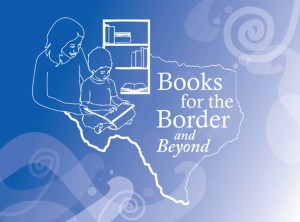
More than 1,200 families have received beginning home libraries in the past five years through church-based family reading fairs under the Books for the Border banner. Books for the Border began in seven Texas counties identified as among the twenty poorest counties in the United States.
Books for the Border is now in phase two: Books for the Border and Beyond. Following Together for Hope’s Objective Two:
Churches, organizations, mission groups, and individual volunteers who participate in TFH efforts in the focal counties will gain a greater awareness of our biblical mandate with the poor and will be able and willing to implement what they have learned with the poor in their home communities. (www.ruralpoverty.net)
Family reading fairs have been hosted in a variety of such communities beyond the Texas-Mexico Border, including Amarillo, Dallas, Joshua, Lubbock, and San Antonio. Others are planned for Copperas Cove, Corpus Christi and Fort Worth this year.
A reading fair in your community would involve identifying families in your community, getting a bookshelf pattern from Literacy ConneXus, building them, collecting and buying age appropriate books and holding the actual fair to distribute the books and bookcases. A project outline is available in the Books for the Border Planning Guide.
Significantly, literacy projects including books and bookcases or bookshelves have been held in other Together for Hope venues in Alabama, Arkansas, Florida, Kentucky, North Carolina, and South Carolina.
But what happened recently causes me to try to capture my thoughts now. Karen Morrow – CBF missionary to refugees in Texas – and I sat with three Karen refugees and three members of Agape Baptist Church in Fort Worth looking for common ground between the real need for language skills of children entering kindergarten in American schools and the linguistic heritage and skills of that ethnic group. (See http://en.wikipedia.org/wiki/Karen_people)
Karen and I have both just completed reading When Helping Hurts (http://www.whenhelpinghurts.org/). Chapter Five provides an excellent explanation of asset mapping. Implementing this idea, beginning with recognition of the gifts and talents of the group, was a challenge with language differences–to say nothing of cultural differences. We were wondering how home libraries (ala Books for the Border) might fit in the context of Karen families living in Texas. We did not leave with clarity so much as commitment to begin with what we learned of the desire of these brave people to preserve their language while gaining English. We will walk with them to discover how to use the Karen love for their children and the valuable gifts of volunteers who stretch to help in ways that do not hurt.
Literacy Connexus seeks to work with those who recognize the value of placing libraries in every home—especially for those living in poverty. Children who are read to, who see their parents reading, and who grow up in homes with books are more ready for kindergarten. What about your community?
A workshop session entitled A Library in Every Home will be offered at the Metroplex Literacy Conference in Dallas March 10 (See http://hopeliteracy.com/). For additional information about ways to encourage and equip ESL students to read to their children, contact Lester Meriwether, 817-696-9898/Lester@literacyconnexus.org.
